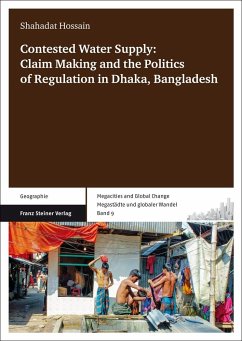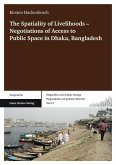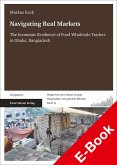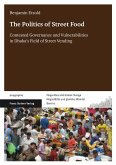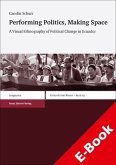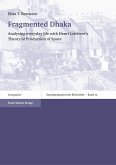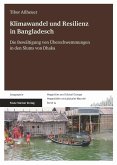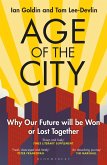Offering an alternative reading of the contested nature of access to public resources in Dhaka, this e-book argues that the contestation of access cannot be explained only by the city's rapidly growing population; it rather describes it as a product of context-specific structures of power and dependency - 'the politics of regulation'.
This study gives a detailed account of the large diversity of local arrangements and their underlying strategies for negotiation and legitimation in the process of claim making to water supply. It presents constellations of influential actors and their interests and explains how their negotiations in an unbalanced power structure determine the distribution of and access to public water supplies.
The author followed an ethnographic research approach and applied a complex and innovative set of qualitative methods for investigation in a low income inner-city squatter area and in a growing peripheral settlement of Dhaka. Frequent participation in adda (casual talks), and personal access to the water supply authority enabled him to observe the routines of everyday life and the complexities of public decision making.
Shahadat Hossain is a Research Fellow at the School of Spatial Planning, TU Dortmund University, Germany since 2007. He holds an undergraduate degree in Urban and Regional Planning from the Bangladesh University of Engineering and Technology (BUET), an MA in Development Management from the Ruhr Universität Bochum and a PhD from the School of Spatial Planning, TU Dortmund University. In the past he worked in development cooperation, taught at the Department of Urban and Regional Planning, BUET, Bangladesh and worked in German Research Foundation supported research projects. Currently he is involved in a research project on translating urban infrastructures: adaptation and creativity in water and sanitation systems in African cities conducted at the School of Spatial Planning, TU Dortmund University. His research interests include urban informality, citizenship, urban governance, power and politics in planning, social exclusion, and ethnographic approaches to social science research.
This study gives a detailed account of the large diversity of local arrangements and their underlying strategies for negotiation and legitimation in the process of claim making to water supply. It presents constellations of influential actors and their interests and explains how their negotiations in an unbalanced power structure determine the distribution of and access to public water supplies.
The author followed an ethnographic research approach and applied a complex and innovative set of qualitative methods for investigation in a low income inner-city squatter area and in a growing peripheral settlement of Dhaka. Frequent participation in adda (casual talks), and personal access to the water supply authority enabled him to observe the routines of everyday life and the complexities of public decision making.
Shahadat Hossain is a Research Fellow at the School of Spatial Planning, TU Dortmund University, Germany since 2007. He holds an undergraduate degree in Urban and Regional Planning from the Bangladesh University of Engineering and Technology (BUET), an MA in Development Management from the Ruhr Universität Bochum and a PhD from the School of Spatial Planning, TU Dortmund University. In the past he worked in development cooperation, taught at the Department of Urban and Regional Planning, BUET, Bangladesh and worked in German Research Foundation supported research projects. Currently he is involved in a research project on translating urban infrastructures: adaptation and creativity in water and sanitation systems in African cities conducted at the School of Spatial Planning, TU Dortmund University. His research interests include urban informality, citizenship, urban governance, power and politics in planning, social exclusion, and ethnographic approaches to social science research.
Dieser Download kann aus rechtlichen Gründen nur mit Rechnungsadresse in A, B, BG, CY, CZ, D, DK, EW, E, FIN, F, GR, HR, H, IRL, I, LT, L, LR, M, NL, PL, P, R, S, SLO, SK ausgeliefert werden.

